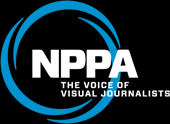National Press Photographers Association
The National Press Photographers Association (NPPA) is an American professional association made up of still photographers, television videographers, editors, and students in the journalism field. Founded in 1946, the organization is based in at the Grady College of Journalism and Mass Communication at the University of Georgia. The NPPA places emphasis on photojournalism, or journalism that presents a story through the use of photographs or moving pictures. The NPPA holds annual competitions as well as several quarterly contests, seminars, and workshops designed to stimulate personal growth in its members. It utilizes a mentor program which offers its members the opportunity to establish a relationship with a veteran NPPA member and learn from them. The organization also offers a critique service, a job bank, an online discussion board, and various member benefits.

| Abbreviation | NPPA |
|---|---|
| Formation | 1946 United States |
| Location | |
| Website | nppa.org |
Their members include still and television photographers, editors, students and representatives of businesses that serve the photojournalism industry. As of 2017, NPPA had total membership at just over 6,000.
Members of NPPA abide by a strict code of ethics.[1]
Incorporation
NPPA was incorporated on October 3, 1947. The original certificate of incorporation outlined six key objectives.
- To advance press photography in all its branches
- To promote the general welfare and conditions in the press photography field
- To create, promote, and maintain cordial relations and cooperation, a higher spirit of fraternalism, the interchange of thought and opinion freely, and a high standard of conduct among its members
- To distribute and disseminate accurate information in regard to matters pertaining to the photographic press of the nation
- To settle equitably and justify the differences between its members
- To preserve, stabilize, unify, and coordinate all elements of the photographic press of the nation
The NPPA is a 501(c)(6) organization.[2]
Notable past members
- Marion Carpenter, first female National Press Photographer to cover Washington, D.C., the White House and travel with a U.S. President.
Advocacy
In August of 2019 the National Press Photographers Association and the American Society of Media Photographers filed an amicus brief in support of Jim Olive in University of Houston System vs. Jim Olive Photography, D/B/A Photolive, Inc. The brief was joined by the North American Nature Photography Association, Graphic Artists Guild, American Photographic Artists, and Professional Photographers of America. "The case began when Texas photographer Jim Olive discovered that the University of Houston was using one of his aerial photographs for marketing purposes without permission. When Olive asked the University to pay for the use, they refused and told him they were shielded from suit because of sovereign immunity, which protects state government entities from many lawsuits."[3] After a negative ruling from a Texas appellate court Olive hopes to continue his fight.[4][5][6]
In 2019 the Supreme Court of the United States granted certiorari in Allen v. Cooper, raising the question of whether Congress validly abrogated state sovereign immunity via the Copyright Remedy Clarification Act in providing remedies for authors of original expression whose federal copyrights are infringed by states.[7][8][9][10] Thirteen amici including; the United States Chamber of Commerce, the Recording Industry Association of America, the Copyright Alliance, the Software and Information Industry Association and the National Press Photographers Association, filed briefs in support of Allen.[11][12][13] Those briefs proposed various doctrines under which the CRCA could validly abrogate sovereign immunity and variously re-asserted and supported the reasons why Congress examined and enacted CRCA, claiming that Congress was fair in finding that states had abused immunity and that an alternative remedy was needed.[14] On November 5, 2019 the United States Supreme Court heard oral arguments in Allen v. Cooper. A decision in the case is expected in the late spring of 2020.[15]
References
- "NPPA Code of Ethics". National Press Photographers Association. Retrieved 4 Jul 2015.
- "501(c)(6) certification letter" (PDF). IRS. Retrieved June 21, 2017. Cite journal requires
|journal=(help) - Mickey Osterreicher, Alicia Calzada. "Texas Appellate Court holds that government piracy of copyrighted work is not a takings". NPPA. National Press Photographers Association. Retrieved 18 November 2019.
- "University of Houston System v. Jim Olive Photography". Copyright Alliance. Retrieved 18 November 2019.
- Edwards, Jenny (18 June 2019). "Fstoppers Interviews Jim Olive, the Texas Photographer Whose Copyrighted Image was Stolen by the University of Houston". Fstoppers. Retrieved 18 November 2019.
- Sixel, L.M. (14 June 2019). "Texas court says photographer has no recourse against university copyright infringement". Houston Chronicle. Retrieved 18 November 2019.
- "Allen v. Cooper".
- "No. 18-877". Supreme Court of the United States. Supreme Court of the United States. Retrieved 25 July 2019.
- Liptak, Adam (2 September 2019). "Blackbeard's Ship Heads to Supreme Court in a Battle Over Another Sort of Piracy". New York Times. Retrieved 20 October 2019.
- Gardner, Eriq (5 November 2019). "Supreme Court Wrestles With Consequences for Piracy by State Governments". Hollywood Reporter. Retrieved 16 November 2019.
- "Allen v. Cooper". Copyright Alliance. Retrieved 18 November 2019.
- "NPPA, ASMP asks SCOTUS for protection of copyright infringement by states". NPPA. Retrieved 18 November 2019.
- "Allen v. Cooper". U.S. Chamber Litigation Center. Retrieved 18 November 2019.
- Kass, Dani. "Copyright Cavalry Supports Pirate Ship Photog At High Court". Constitutional Accountability Center. Retrieved 17 November 2019.
- Murphy, Brian (5 November 2019). "How Blackbeard's ship and a diver with an 'iron hand' ended up at the Supreme Court". Charlotte Observer. Retrieved 16 November 2019.